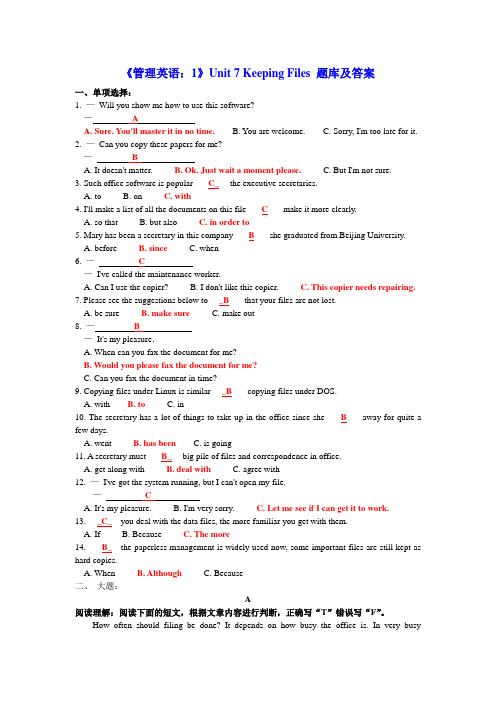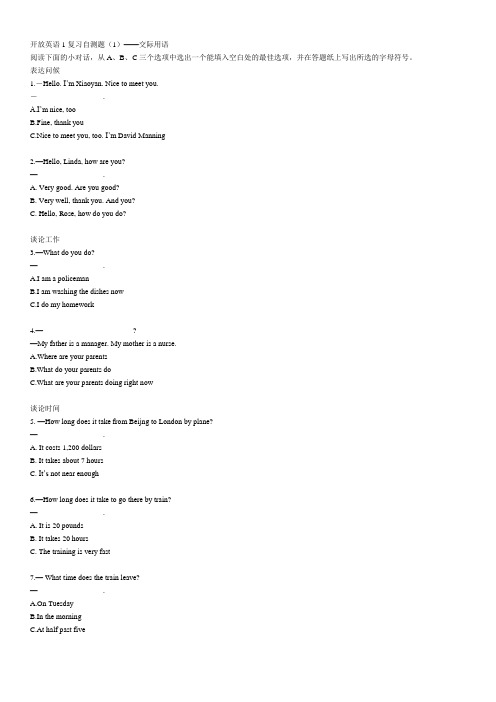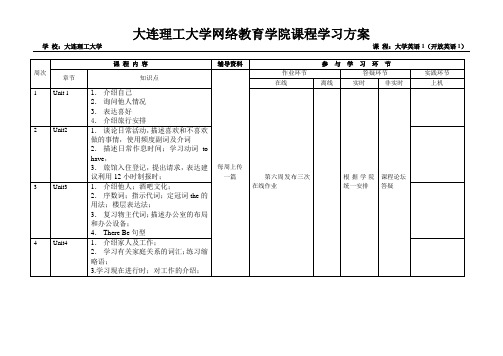开放英语1Unit7-Unit11
- 格式:doc
- 大小:77.50 KB
- 文档页数:12

《管理英语:1》Unit 7 Keeping Files 题库及答案一、单项选择:1. —Will you show me how to use this software?—AA. Sure. You'll master it in no time.B. You are welcome.C. Sorry, I'm too late for it.2. —Can you copy these papers for me?— BA. It doesn't matter.B. Ok. Just wait a moment please.C. But I'm not sure.3. Such office software is popular ___C___ the executive secretaries.A. toB. onC. with4. I'll make a list of all the documents on this file ___C___ make it more clearly.A. so thatB. but alsoC. in order to5. Mary has been a secretary in this company ___B___ she graduated from Beijing University.A. beforeB. sinceC. when6. —C—I've called the maintenance worker.A. Can I use the copier?B. I don't like this copier.C. This copier needs repairing.7. Please see the suggestions below to ___B___ that your files are not lost.A. be sureB. make sureC. make out8. — B—It's my pleasure.A. When can you fax the document for me?B. Would you please fax the document for me?C. Can you fax the document in time?9. Copying files under Linux is similar ___B___ copying files under DOS.A. withB. toC. in10. The secretary has a lot of things to take up in the office since she ___B___ away for quite a few days.A. wentB. has beenC. is going11. A secretary must ___B___ big pile of files and correspondence in office.A. get along withB. deal withC. agree with12. —I've got the system running, but I can't open my file.— CA. It's my pleasure.B. I'm very sorry.C. Let me see if I can get it to work.13. ___C___you deal with the data files, the more familiar you get with them.A. IfB. BecauseC. The more14. ___B___the paperless management is widely used now, some important files are still kept as hard copies.A. WhenB. AlthoughC. Because二、大题:A阅读理解:阅读下面的短文,根据文章内容进行判断,正确写“T”错误写“F”。

学习记录表11 请写出下列名词的复数形式。
parent – parents photo – photos bus – buses life – liveshalf – halves child – children woman – women tooth – teeth2 频度副词often, always, sometimes,usually等在句中的位置是有规律的,请写出这些规律,并各举一个例子。
1)在动词 to be 之后:eg. I’m usually ill on planes.Are you usually at home on Monday?2)在实意动词之前。
eg. I sometimes go to London.I always work on Monday.3)在含有助动词的句子中,置于助动词之后,实意动词之前。
eg. He doesn’t always work on Tuesday.I don’t usually go to work by bus.3 请写出现在进行时的两种用法,并分别举一个例子。
1)表示此刻正在发生的事情或正在进行的动作。
eg. I’m waiting for an important call from my boss in Shanghai.2)表示这一阶段正在进行的活动,虽然在此时此刻这个活动可能并没有进行。
eg. Liufan is currently working on TV advertisements, but right now he is on holiday.4 请用学过的功能句型介绍一下你自己的姓名,年龄,所在城市,工作。
eg. My name is …I’m called …I’m …eg. I’m …years old.eg. I live in Sanmen.eg. I’m a teacher./a policeman./a doctor….开放英语(1)作业1(Unit 1-6)第一部分:交际用语1-5 AABBA其次部分:词汇与结构6-10 BACCC 11-15 BBCCC 16-20 BABBA 21-25 BACCA第三部分:句型变换26. Is he a manager?27. Does she usually go to work by bus?28. Are there fifty students in the class?29. Do they have a large house? / Have they a large house?30. Is he currently working on TV advertisements?第四部分:阅读理解31-35 BAABB 36-40 BBBAC第五部分:翻译41. 会议室在底楼。

开放英语1复习自测题(1)——交际用语阅读下面的小对话,从A、B、C三个选项中选出一个能填入空白处的最佳选项,并在答题纸上写出所选的字母符号。
表达问候1.-Hello. I‟m Xiaoyan. Nice to meet you.- _________________.A.I‟m nice, tooB.Fine, thank youC.Nice to meet you, too. I‟m David Manning2.—Hello, Linda, how are you?— _________________.A. Very good. Are you good?B. Very well, thank you. And you?C. Hello, Rose, how do you do?谈论工作3.—What do you do?— _________________.A.I am a policemanB.I am washing the dishes nowC.I do my homework4.—________________________?—My father is a manager. My mother is a nurse.A.Where are your parentsB.What do your parents doC.What are your parents doing right now谈论时间5. —How long does it take from Beijng to London by plane?— _________________.A. It costs 1,200 dollarsB. It takes about 7 hoursC. It‟s not near enough6.—How long does it take to go there by train?— _________________.A. It is 20 poundsB. It takes 20 hoursC. The training is very fast7.— What time does the train leave?— _________________.A.On TuesdayB.In the morningC.At half past five表达提议8.—The shower isn‟t working.— _________________.A.I come to call the plumberB.I‟ll call the plumberC.I like calling the plumber9.—Would you like to go with us?— _________________.A. Ok, I‟d loveB. I would likeC. I‟d love to10.—_________________?—An orange juice, please.A. What do you likeB. What would you likeC.Would you like an orange juice11.— _________________.—That‟s a good idea.A. When can you write the invitationsB.What do you think of the invitationsC.Why don‟t we write the invitations now12.—Could you ring them up please? I‟m sometimes quite nervous on the phone. —____________________A. Are you? I am fine.B. Yes, why don‟t you call them?C. Yes, of course. I will phone them for you.13.— How about seeing a film this evening?— Yes, _____________.A. that‟s a good ideaB. pleaseC. that‟s right问路与指路14.— Excuse me, where is the nearest bank, please?— _________________.A. It‟s not sureB. That‟s all rightC. It‟s next to the newsagent15.—Excuse me, how do I get to the gym, please?— _________________.A. You take the number 866 bus from the supermarketB. It takes about an hour to get thereC. I‟d like to see them描述人的外貌16.— What does your English teacher look like?— _________________.A. She likes singingB. She‟s tall and has long, wavy hairC. She looks sad17.—What does her boyfriend look like?— _________________.A. He is intelligent and confidentB. He likes playing footballC. He is quite tall with fair curly hair描述天气18. —What‟s the weather like in this area?— _________________.A. That‟s all rightB. It‟s rainyC. Yes, i t‟s fine询问价格(Unit 5 )19.—How much is the rent of the flat?— _________________.A. The hotel room is expensiveB. It is 450 pounds a monthC. It is near the center of the city询问病情20.— _________________?—I‟ve got a bad cough.A. What‟s the matter with youB. What is it likeC. How was your day yesterday参考答案:1.C2.B3.A4.B5.B6.B7.C8.B9.C10. B11.C12.C13.A14.C15. A16.B17.C18.B19.B20. A开放英语1复习自测题(2)——词汇与结构阅读下面的句子和对话,从A、B、C三个选项中选出一个能填入空白处的最佳选项。

综英翻译Unit 11.They took advantage of our helpless situation and took over our company.他们利用我们求助无门的困境把我们公司接管了。
2.Although there are still difficulties ahead of us, I am sure that we Chinese people will have the wisdom to bring about the peaceful unification of our country on our own.虽然我们面前仍有困难,但我肯定我们中国人有智慧靠自己实现国家的和平统一。
3.It is wrong to put emphasis on nothing but GDP. It will give rise to many serious problems.只强调国内生产总值是错误的,它会引起很多严重的问题。
4.He loves to show off his wealth, but that is all in vain. People still avoid him as though he were poison.他喜欢炫耀他的财富,但是这完全是徒劳的,人们仍然像躲避毒药那样躲避他。
5.He soon fell in love wit the village and was determined to make it a beautiful garden together with other villagers.他不久就爱上了这个村子。
他决心和村民一起把这个地方变成一个花园。
6.We must spend more money fighting against global warming. In addition, we must resort to tough laws. It is not just a matter of money.我们必须花更多的钱来和全球气温上升作斗争。

开放英语(3)作业 1(Units 1-6)第一部分: 交际用语(每题2分, 共10分)一、阅读下面的小对话, 从A、B、C、D四个选项中选出一个能填入空白处的最佳选项。
1. May I help you, madam?_________ ____________.A.Sorry, I have no ideaB. Yes, I know what to buyC.You’d better give me a handD. Yes, I ‘d like 2 kilos of or anges2. May I know your address?_______ ______________.A.Sure. Here you are.B. I have no ideaB.It’s far from here D. Sorry, I’ve forgotten3. Well, Mary, how are you?_____________________.A. I’m goodB. I’m pleasedC.I’m fineD. I’m nice4. I don’t like the sports programs on Sundays._ ______A. So do IB. Neither do IC. So am ID. Neither am I5. Will you go on a picnic with us tomorrow?__________________________.A.Yes, but I’ll have English classes.B.Sorry, I have an appointment with Dr. Brown.C.I’m afraid I have no idea.D.Neither am I第二部分:英语知识运用(40分)二、选择填空阅读下面的句子和对话,从A、B、C、D四个选项中选出一个能填入空白处的最佳选项。

开放英语I(1)作业1(Unit 1~6)第一部分交际用语(10分)1-5题: 阅读下面的小对话,判断稚是否恰当,恰当的选A(Right),不恰当的选B(Wrong),并将答案写在各题前的()中。
(每题2分,共10分)(A) 1.-How old is the manager?-- He is 35 year old.A. RightB. Wrong(A) 2. – What do they do ?-- They work in a bank.A Right B. Wrong(B) 3. –Would you like some crisps?- No, I’m sorry..A. RightB. Wrong(B) 4. – How much does the flat cost a month?- It’s on the tenth floor.A. RightB. Wrong(A) 5. – Could you sign the register, please?- Of course.A. RightB. Wrong第二部分词汇与结构(40分)6~25小题:阅读下面的句子,选择正确答案,并将所选项的字母符号写在各题前的()中。
(每题2分,共40分)(B)6. He _____ for an IT company.A. workB. worksC. working(A) 7. I have coffee _____ breakfast timeA. atB. inC. on(C) 8. _____ name is Wanghua.A. HeB. He’sC. His(C) 9. She is _______ only accountant in my son’s company.A. aB. anC. the(C) 10. Maria often has a walk with _______ parents in the morning.A. sheB. theirC. her(B) 11. _________ you got any family ?A. DoB. Have C Has(B) 12. He’s responsible _____ the central computer system.A. inB. forC. of(C) 13. The Business Banking Department is on ____ floor.A. secondB. the twoC. the second(C) 14. Wang Li is _______ a new market campaign at the moment.A. planB. planingC. planning(C) 15. Polly enjoys ________ the guitar in a band in her free time.A. playB. to playC. playing(B) 16. There ________ three plants in the corners of the room.A. isB. areC. have(A) 17 I work in ______ IT Department of ________ large bank.A. the, aB. a, theC. a, a(B) 18. What ______ “nr” mean?A. isB. doesC. do(B) 19. I sometimes go to the pub _______ Friday.A, in B. on C. at(A) 20. ________ people are my friends. _________ people are my husband’s friends.A. These , ThoseB. This , ThatC. Here, There(B) 21. He _____ in Beijing, but his parents _________ in Hangzhou.A. live , livesB. lives, liveC. live, live(A). 22. My husband doesn’t _________, but I like it very much.A. like shoppingB. likes shoppingC. likes to shop(C) 23. - ___ are you from?- I’ m from Nanjing.A. WhatB. WhenC. Where(C) 24. He _______ lunch in the canteen right now.A. hasB. haveC. is having(A ) 25. ______ children has his brother got?A. How manyB. How muchC. How about第三部分句型变换(15分)26~30 小题:将下列句子改写为一般疑问句。
Unit-7-Learning-Strategies课文翻译(fānyì)大学体验英语一Unit-7-Learning-Strategies 课文翻译大学体验(tǐyàn)英语一Unit 7 Learning StrategiesPassage A Not Just a Job, an Adventure: Undergraduate ResearchSophia Stella, a sophomore at Columbia's School of Engineering, is one of many undergraduates who become involved, one way or another, in research performed at the university. Some do it for academic credit, some for money, some just for experience. Students and professors agree that an undergraduate research project can be uniquely beneficial to both parties.Ideally, undergraduate research is an opportunity for the kind of intensive study that can expand the mind in ways traditional courses can't. Economics Professor Ralph Edison says: "To really understand a discipline you have to get the feeling that knowledge isn't just out there and you passively have to absorb it, but rather that it's constantly beingcreated and we're constantly rethinking things... When students see a discipline as evolving rather than fixed, they usually get a lot more excited about learning because they see that it's an ongoing process." He points out that research can be exciting because "a research project really gives students an opportunity to answer real-life questions that we don't know the answers to."Research also spurs independent thinking and intellectual confidence in students. Amelia, a graduate student in computer science, says, "You had to go out and learn on your own. You weren't going to be spoon-fed." Her fond memories of work as an undergraduate researcher played an important role in her decision to leave her Wall Street programming job and return to Columbia as a graduate student.Arthur Hannah, a political science graduate of Columbia College says undergraduate research "felt like a whole new mode of learning." Instead of looking for the knowledge we do have, he says, research forces students to look for knowledge we don't have. It's a process of looking for holes and trying to plug them, which is completely different from the classroom experience of learning what others already know. He also describes how creating a piece of original research instilled a "pride of authorship" in his work, something he hadn't found in his regular classes.Most undergraduates doing research are working for credit. They register for a semester-long course and do a project for a professor who gives them a grade for their efforts. In some departments a research project might constitute an honors thesis.Some students do research for pay. Taken simply as a form of employment, it's one of the most desirable jobs available to undergraduates. Stella says, "I need some kind of income, and I'd rather work here than in the cafeteria"; paid research work gives her an opportunity to transform a work-study job into an engaging aspect of her education. The money for her wages is available because of a program started this year providing $100 000 to fund undergraduate research. This funding is intended to support about 50 undergraduates in work-study research positions.Other students do research not for credit or for money but simply on a volunteer basis. Usually, these are students pursuing a career that requires some demonstration of altruistic commitment, such as medicine.As Economics Professor Ralph Edison says: "Undergraduate research can become a valuable part of education. It's a real and valuable privilege. It hasto remain an extraordinary undertaking for extraordinary people in extraordinary circumstances."A篇大学生在校搞研究(yánjiū)哥伦比亚大学工程学院二年级学生(xuésheng)索菲亚·斯黛拉,是众多以各种方式在校参与研究工作(gōngzuò)的学生之一。
Book 1 Translation ExercisesUnit 1 Translation1)当我知道详细情况时,我意识到我不该在办公室发脾气。
(should not have done)2)我和鲍勃不是很熟,不过我们偶尔一起出去喝一杯。
(occasional)3)会议应该在周二召开,但我们不得不推迟(be supposed to)4)我国政府采取行动使那个国家的所有中国人回到了祖国( take action)5)包括周末在内,仅仅还有12天时间可以用来买圣诞礼物。
(including)6)如果不立即采取行动,许多种野生动物就会因饥饿而死亡。
(without, hunger) 1)When I knew the details, I realized I shouldn’t have lost my tempers inthe office.2)I don’t/didn’t know Bob very well, but we go/went out for anoccasional drink together.3)The meeting is supposed to taken place on Tuesday,but we have to putit off.4)4〕Our government took action immediately to bring all the Chinesein that country back to motherland.5)Including weekends, there are only twelve more days to buy Christmaspresents.6)Without immediate action, many kinds of wild animals would die fromhunger.Unit 2 Translation1)那首歌总是使她回想起在芝加哥度过的那个夜晚。
开始时间2018年11月2日星期五10:59一、选择填空题目1未回答满分10.00标记题目题干—I was worried about my driving test, but I passed it.—______________选择一项:A. Don't worry about it.B. Good luck to you.C. Congratulations! That's not easy.反馈解析:本题考核“表达祝贺”的交际用语。
根据本题提供的信息,讲话人是在向他人诉说自己意想不到的欣喜,希望与人分享,所以根据英语的交际习惯,应该表示祝贺,所以这道题选择C。
正确答案是:Congratulations! That's not easy.题目2未回答满分10.00标记题目题干—I won the first prize in today's speech contest.—_____________选择一项:A. Congratulations!B. Great!C. Thanks反馈解析:本题考核“祝贺别人”的交际用语。
当别人告诉一个关于自己的好消息时候,通常都是要祝贺对方,所以这道题选择A。
正确答案是:Congratulations!题目3未回答满分10.00标记题目题干The novel I bought last week is_______ of reading, I think.选择一项:A. worthyB. worthC. that worth反馈译文:我认为上周我买的小说值得一读。
解析:本题考查be worthy of +doing的用法,表示某事值得被做。
Be worth+doing也可以表示值得做,但没有介词of, 所以选A。
正确答案是:worthy题目4未回答满分10.00标记题目题干The street is ________ for five cars to go side by side.选择一项:A. wideB. wide enoughC. enough wide反馈译文:街道上面宽到足以能让五辆车并行。
Unit 7 Making Appointment一、表达提议;二、表达批评;三、打电话用语一、1.表达提议:结构Would you like to+动词原形1).---Would you like to come to dinner tonight?---Yes , I would , thanks./I’d love to (No, ,I wouldn’t, thanks.)2).---What would you like ?----An orange juice, please.3).---Would you like to stay the night?--- I’d love to .4).The shower isn’t working ?------I’ll call the plumber.2.提供建议:结构:What about…? How about…? Why don’t you …?注意:about 是介词后加V-ing的形式。
1)--How about seeing a film this evening?---That’s a good idea.2)--How about 6 O’clock ? ---Yes, 6 O’clock is fine (OK).3)---What about taking a taxi?---That’s a good idea.4)---Why don’t we write the invitation now?---That’s a good idea.2、建议约会:1)建议日期---Are you free on Wednesday?---Yes,We dnesday is fine.(No, I’m afraid I’m not free.)---What about Friday?---Yes, That’s OK.(No, I’m sorry,I’m busy.)2)建议具体日期---How about 6 O’clock?---Yes, 6 O’clock is fine.(No, I’m afraid I’m not free.)--Is 6 O’clock OK?---Yes, That’s OK.(No, I’m sorry I’m busy)二、表达批评:句型:“too+形容词”或者“not +形容词+enough ”,这两种句式意义相近,意为“太……”,“不够……”。
I don’t like the flat .It’s too near the road.我不喜欢这套公寓,离公路太近。
The living room is not comfortable enough.起居室不够舒服。
I don’t like the flat .It’s too near the road.我不喜欢这套公寓,离公路太近。
The living room is not comfortable enough.起居室不够舒服。
三、询问花多长时间。
句型“It takes +(时间)+ to do sth.”或者“Sth takes + (时间)表达“某事花多长时间”---How long does it take to get to your tube?---It takes about half an hour.It takes about forty minutes to get from the airport to the city center by taxi.三、询问花多长时间。
句型“It takes +(时间)+ to do sth.”或者“Sth takes + (时间)表达“某事花多长时间”---How long does it take to get to your tube?---It takes about half an hour.从机场到市中心乘出租车大约需要40 分钟。
四、打电话用语:1、接电话时用:Hello ,Good morning,(good afternoon)/good morning,Caffe Roma.2、打电话时介绍自己用:This is…/This is … speaking.3、请人接电话时用:1)Could/Can I speak to …,please?2)Is … in( there).please?4、询问打电话者或者接电话者:1)接电话者问打电话是谁,通常用Who’s calling?/Who’s that?/Whom am I speaking to?2)接电话者恰好就是要找的人,可以说:Is that…?/Is that you ,..?5、接听者找人接电话时:One moment, please,I’ll get her /him./sorry ,he/she isn’t here./Hold on ,please./sorry, I’m afraid he/she is out.6、请对方转达口信Could/Can I leave a message ,please?1、can 表示现在的能力,could 表示过去的能力,例如:He can speak a little English now.She could play the piano when she was five.2、在表示请求许可时,没有时间区别,在语气上could 更加委婉客气,例如:Can I use your pen ?Could I have a look at your book ?3、在表示可能性方面,没有时间区别,can 可能性比could 大;1、can 表示现在的能力,could 表示过去的能力,例如:He can speak a little English now. She could play the piano when she was five.2、在表示请求许可时,没有时间区别,在语气上could 更加委婉客气,例如:Can I use your pen ?Could I have a look at your book ?3、在表示可能性方面,没有时间区别,can 可能性比could 大;表示逻辑上或理论上的可能性,而不是某种实际上将要发生或正在发生的可能性。
Can it be true? 这会是真的吗?Anybody can make mistake.任何人都可能犯错误。
The weather here could be very cold in winter. 冬天这的天气有时很冷。
一般用于否定句和疑问句。
He can't be at home.他不可能在家。
注意和may not 的区别。
He may not be at home. 他可能不在家。
也可以用于肯定句。
,An accident can happen if you do this.如果你这样做,可能会发生事故Unit 8 Moving In一、情态动词can表示允许;二、一般现在时与现在进行时;三、描述天气;四、描述城市;五、祈使句的结构。
一、情态动词can表示允许。
情态动词不能独立作谓语,一定要跟行为动词一起构成谓语。
情态动词:can ,could , may, might, must, need, will, would, shall, should.1、情态动词can表示能力。
1)I can swim.(我会游泳。
)2)Can you sing?(你会唱歌吗?)2、情态动词can表示允许:1)You can use the phone in the living room.你可以用起居室里电话。
2)You can’t smoke in the bedroom.你不许在卧室里吸烟。
3)Can I use the cooker in the kitchen room.我可以用厨房的餐具?3、一般疑问句将can置于句首。
用于第一人称的疑问句可以表示询问他人是否允许。
否定有两种形式:cannot或can’tCan I use the phone in the hall?4、can用于肯定句表示允许,否定句表示不允许。
1)You can smoke in the kitchen.(改为否定句)→You cannot/can’t smoke in the kitchen.2)She should go to see a doctor.(改为否定句)→She shouldn’t go to see a doctor.3)They must do their homework tonight.(改为一般疑问句)→Must they do their homework tonight ?4) You can use the phone in the living room(改为一般疑问句)→Can you use the phone in the living room?5)He can smoke in the garden.( 用what对划线部分提问)→What can he do in the garden ?二、一般现在时与现在进行时。
1、一般现在时:表示经常发生的事情(这些动作可能每天、每时或经常发生)。
1)I cook for my family.(我为家人做饭。
)2)She doesn’t like borrowing things from others她不喜欢借别人东西。
2、现在进行时表示现阶段或说话的时刻正在发生的动作。
I’m talking now.You’re listening to me. I’m looking for a flat on the ground floor.(我在寻找一套底楼的套房。
)3、英语中动词就其词汇意义来讲分为表示动作的动词和表示状态的动词两类。
有些动词只用于一般现在时,而不能用于进行时。
这些动词表示相对静止的物质,心里及情感状态,被称为状态动词。
如:to be, to have/to have got, to like ,to love ,to hate, to think. He is Englis h. I have two brothers. I think it’s cheap.但have作为行为动词,不表示拥有时,可以构成进行时。
I’m having lunch. Think 做“想”、“思考”时也有进行时态。
三、描述天气:询问天气状况常用What’s(what is) the weather like in +(某地)。